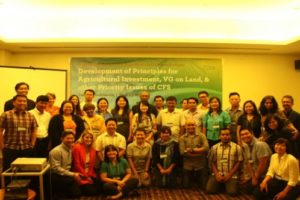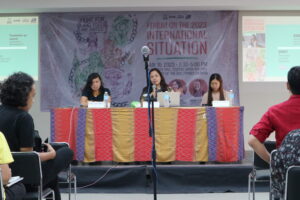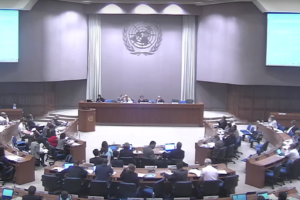IBON INTERNATIONAL STATEMENT ON COP 20 OUTCOMES
As the 20th UN Climate Change Conference of the Parties (COP) in Lima draws to a close, hopes for a system-changing deal are dimming fast.
The Lima Summit revolved around “three main pillars” – climate adaptation, mitigation, and loss and damages – that are to form three chapters of a book-length report to be threshed out in Paris (COP21) next year, where a binding climate agreement is to be decided.
On nearly all counts, the Lima outcome amounts to a major step-back on the climate negotiations so far. Even by the dilute standards of the Kyoto Protocol, the draft agreement is unambitious, offers no regulatory framework for what is supposed to be a “binding” climate agreement, and completes a process that blurs the distinction between global north and south (Annex I or industrialised and developing countries).
What has occurred is a shift of responsibility from rich to poor.
A principle that had been at the heart of the negotiations from the very beginning, Common But Differentiated Responsibilities (CBDR), is being replaced instead of elaborated by “intended nationally determined contributions” (INDCs) – which the global North insists must be voluntary country commitments focused only on mitigation. While allowing countries to set their own targets, the INDCs as narrowly defined by the champions of the North are detached from all justice or equity considerations, scientific recommendations, or historical responsibility for global carbon emissions.
Despite claims of an easing of north-south tensions, political divisions between developed and developing countries persist. Throughout the two-week-long negotiations, debates revolved around the issues of historic responsibility and climate financing.
Developed country governments emphasized mitigation as central to the INDCs. There was much ado over the rise of China and India as new players on the table of high-emitters, while the size of their populations or the fact that these countries simply absorb the bulk of high-carbon emitting production offshored from the West continues to be ignored. On the other hand, historic responsibility for carbon emissions was at the core of arguments by developing country delegations, which insisted that the INDCs go beyond mitigation, and enable the transfer of resources from north to south to finance adaptation, technology transfer, and capacity development.
In any case, no mechanisms or guarantees exist to ensure increased levels of ambition on emissions reductions on the part of developed country governments. Off the table were discussions about compulsory repayments – in the form of loss and damages – to developing countries for economic and social harms due to climate change. And while all parties had agreed on setting a final goal even before the negotiations began, ambiguity still exists over whether the world should aim at preventing a 1.5 or a 2 degree rise in global average temperatures.
The debates took a turn for the worse when one of the leading voices in the official negotiations backtracked on its role as a strong voice for the global south. The Philippine delegation was historically among those at the forefront of calling on developed countries to deliver on their emissions reduction commitments, especially in the wake of typhoon Haiyan. But having assumed chairmanship of the informal negotiating bloc of “Most Vulnerable Countries”, the Philippines has since emphasized the need for other developing countries to cut their own emissions[1].
The Philippine government has in effect conceded to the demands of rich country governments, principally the United States and other major powers, by watering down CBDR principles, even as it bankrolls more than a dozen new coal-fired power plants across the country[2].
Such concessions are going to make it all the more difficult for the global south to press for a strong fighting position in subsequent negotiations.
A resilient world (for fossil fuels and market solutions)
Not for the first time, the Climate Summit bore all the markings of the powerful fossil fuel lobby, justifying the erosion of public confidence in the UN as an independent mediator in the climate negotiations. In Lima, an atmosphere of tight-lipped frustration among chief negotiators was disturbed only by the optimism of alleged “solutions” under the framework of the green economy.
New rhetoric over “net zero” emissions paid no attention to the small print: the rich world is free to pollute for so long as the emissions are offshored elsewhere. This gives the green light to false solutions like REDD+[3], carbon capture and storage, geo-engineering and other techno-fixes and market-based mechanisms that are by far most the developed provisions in the UNFCCC currently under debate. In the absence of a clear, binding regulatory framework for the private sector and the fossil fuel industry, these mechanisms end up encouraging emitters through the promise of carbon offsets.
Climate financing is an equally dim prospect. Allocations to the Green Climate Fund (GCF) have reached barely half of government commitments. Only 10% of the US$ 100 billion pledged by developed country governments to the GCF has been mobilised, and now even developing country parties are enjoined to contribute to the pot. Meanwhile, debates over the nature of the GCF have dragged on for years, while governments have not adopted an exclusion list to prevent the funding of fossil fuel projects, nor are there guarantees that climate finance is to be channeled through grants and not debt.
In sum, the Lima Summit failed expectations for a system-changing climate agreement.
System Change, not Climate Change
The stakes are high and the science is clear: global carbon emissions must start coming down by 2020 if we are to prevent temperatures from rising beyond the 2-degree C threshold while avoiding the most devastating impacts of climate change. Meanwhile those impacts are already upon us, in the form of droughts, crop failure, rising sea levels, stronger cyclones, and other extreme weather events that hit countries like the Philippines on an increasingly regular basis.
The climate crisis requires deeper shifts in development paradigms and structural changes in the global economy toward equitable, rights-based alternatives. But clearly this is not what our governments and their corporate allies are prepared to offer. We have instead been given the same menu of market solutions from what appears to be a free buffet, but are in reality served to us ala carte, with the bills to follow.
Market solutions like carbon trading were (and are) promoted as the only “triple win” way out of the climate crisis — despite all scientific evidence to the contrary — while all other alternatives rooted in a critique of the system are downplayed, or treated as utopian.
But this is not how the real world works. What is utopian is a system that believes endless growth is possible, that concentrated wealth trickles down, that politics can be separated from economics, that the commodification of nature, the exploitation of labour and the globalisation of free market capitalism are The Only Alternatives.
IBON International therefore stands in solidarity with all indigenous peoples, trade unions, scientists, environmental activists, and people’s movements around the world who are calling for System Change, not Climate Change. As negotiations for a global climate agreement continue in the lead up to Paris next year, we demand:
- A binding and enforceable global climate agreement, rooted in the principles of CBDR, clear targets on emissions reductions based on honest science, and above all, climate justice as an essential framework for determining INDCs, encapsulating all aspects of human rights, social justice, and equity;
- Fulfillment of existing commitments by Annex I governments, including targets on greenhouse gas (GHG) emissions reductions, technology transfer, climate finance, and payment of past, present, and future loss and damages to the global south, especially for countries and communities most vulnerable to the impacts of a changing climate;
- For industrialised country governments to go beyond their existing pre-2020 emissions reduction targets, in line with their historical contributions to GHG emissions;
- For governments of the global south to commit to alternative, rights-based development trajectories, based on energy sovereignty, which depart from fossil fuel-based models of industrialisation that were and remain unsustainable, inequitable, and unjust;
- INDCs that allow for the broadest possible scope for climate mitigation and adaptation targets alongside mechanisms to ensure that these commitments are carried out, in a manner that is fair, accountable and sensitive to the needs of the global south, especially frontline communities and marginalised populations;
- Fulfillment of all existing and future pledges to a global climate fund that provides for both climate mitigation and adaptation, grants not loans for developing countries, and a clear ban on the funding of all fossil fuel and fossil fuel-related projects;
- Negotiating space and an implementing framework under the UNFCCC free from corporate capture;
- Solutions to the climate crisis that depart from business-as-usual: this means shunning all techno-fixes and market-based models, including carbon trading, REDD+, and geo-engineering, that are based on the same market paradigms that have contributed to the current impasse;
- Climate solutions that pro-actively address the root causes of the climate crisis, including systems of overproduction and waste, which will entail the radical redistribution of wealth at the global and country level, to ensure access to renewable energy, resources, decent wages, and social security for all, and the restoration of the global commons through genuine rights-based sustainable development
__________________________________________________________________________________
NOTES
[1] New York Times. “Philippines pushes developing countries to cut their emissions”. 8 December 2014. Available from http://www.nytimes.com/2014/12/09/world/americas/philippines-pushes-developing-countries-to-cut-their-emissions-.html?smid=tw-share&_r=0
[2] Greenpeace. “Existing Coal Plants and Approved Coal Plants in the Philippines to date”. Available from http://www.greenpeace.org/seasia/ph/PageFiles/440331/PH-Coal-Plant-List.pdf. See also: http://www.rappler.com/business/industries/173-power-and-energy/70519-9-bids-ph-coal-projects
[3] Reducing emissions from deforestation and forest degradation. The REDD + framework has long been criticized for infringing on land rights in the third world, and for incentivizing emissions through carbon offsets and land commodification. See http://www.un-redd.org/ http://www.ipsnews.net/2014/11/will-new-climate-treaty-be-a-thriller-or-shaggy-dog-story/ and Griffiths (2009). Seeing ‘REDD’? Forests, climate change mitigation, and the rights of indigenous peoples and local communities. http://www.rightsandresources.org/documents/files/doc_923.pdf
Editor's note:
Originally posted: December 20, 2014. Minor typographical errors in the text have been corrected as of 24 Dec 2014.



